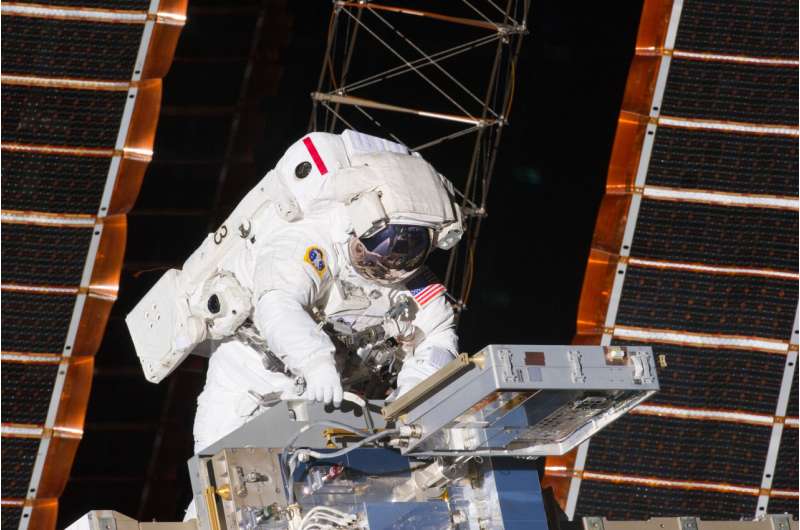
How do we make medicine last the extreme conditions of space exploration?
How would you manage a headache while flying to Mars?
You might try the Earth remedy of taking a painkiller. But on a 2-year round trip, how long would they last? And could you trust them?
Martian migraine
Access to medical supplies is a major concern for astronauts. Sleep issues, pain, congestion and allergies are all common complaints from those on extra-terrestrial missions.
The use of medication by American crewmembers on the International Space Station (ISS) was monitored between 2002 and 2012. And according to the data, astronauts used sleep tablets 10 times more often than earthlings. They also used ibuprofen for pain stemming from space flight pressure changes, higher carbon dioxide levels and joint issues.
Unfortunately, the longer the space flight, the higher the chances of experiencing acute illness. Common health problems for astronauts include a weakened immune system, bone decalcification and low blood pressure.
On Earth, most medicines expire within a year. In space, it can be even sooner unless protected by controlled conditions on the ISS.
To figure out how to extend the lifespan of medication in space, Dr. Volker Hessel from the University of Adelaide led a team to launch common drugs into space.
A space briefcase
One focus was how space radiation might affect ibuprofen. ISS astronauts placed six tablets in the Materials International Space Station Experiment (MISSE). MISSE is essentially four suitcase-sized containers left outside the ISS. Inside them are materials ready to experience the hostile conditions of space, unprotected.
Volker says that, after a year, only two of the six ibuprofen tablets maintained their physical and chemical properties. And they could hold clues to producing longer-lasting medicine.
Commercial ibuprofen tablets are full of other materials called 'excipients' which package the active ingredient. Drug manufacturers add these chemicals to make the tablet palatable or improve uptake in the body. In space, some of these excipients protected the ibuprofen from degrading.
Volker and his team coated their tablets with iron oxide. Due to its high density, iron oxide can block gamma radiation. So the team expected the coating to provide some protection. However, they did not expect some of the artificial flavoring chemicals to help preserve the ibuprofen tablets as well.
Taste sensation, radiation
Each of the test tablets contained a mixture of three excipients: acetic acid flavor, malty-biscuity 037 and 4-ethyl phenol wine flavor. Malty-biscuity 037 tastes rather nice and is produced by browning malt. Tasters describe 4-ethyl phenol as medicinal or horsey.
Volker says the chemical structure of two of these additives might explain why they help ibuprofen last longer in space.
"They basically make radical function groups non-reactive … Each of the three flavors has a different mechanism to do this," says Volker.
Malty-biscuity contains myrcene, which is a terpene. Meanwhile, 4-ethyl phenol has a methylene group. Volker says the structures of these two groups make them free radical scavengers.
Radical, man
One type of radiation—beta radiation—involves high-energy electrons. They can collide with molecules, breaking atomic bonds. These molecules become free radicals, which can react with other molecules. This causes a chain reaction that can quickly break down a tablet.
Free radical scavengers can limit the damage by stabilizing the free radicals. This slows the reaction process that breaks down ibuprofen.
After a year in space, the tablets were sent back to Earth. While the free radical scavenger hypothesis may explain what happened, Volker's team still need to test it. This involves separating the molecules within the tablets by size and identifying them one by one. Once they have determined how the tablets broke down, they can form a clearer picture of what happened.
Doing so could help make longer-lasting medicines for space exploration. With NASA planning to send humans to Mars by the 2040s, astronauts will need medicine that can last the journey.
"We really believe in human space exploration," says Volker. "To have supply chains and space habitats, [long-lasting medicine is] part of the concept."
Explore further
This article first appeared on Particle, a science news website based at Scitech, Perth, Australia. Read the original article.
Citation: The mission to make longer-lasting space drugs (2022, August 17) retrieved 17 August 2022 from https://ift.tt/JywPL1b
This document is subject to copyright. Apart from any fair dealing for the purpose of private study or research, no part may be reproduced without the written permission. The content is provided for information purposes only.
"lasting" - Google News
August 17, 2022 at 10:13PM
https://ift.tt/JywPL1b
The mission to make longer-lasting space drugs - Phys.org
"lasting" - Google News
https://ift.tt/k7Mo3qw
Shoes Man Tutorial
Pos News Update
Meme Update
Korean Entertainment News
Japan News Update
Bagikan Berita Ini














0 Response to "The mission to make longer-lasting space drugs - Phys.org"
Post a Comment